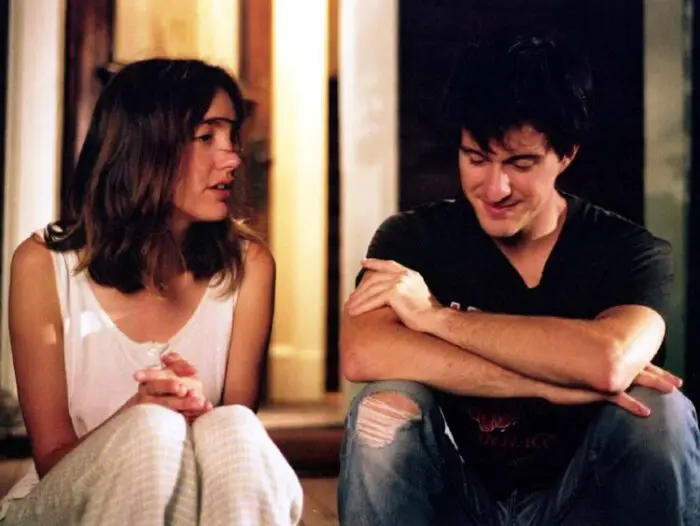Funny Ha Ha (2002) became a “Mumblecore” movie in retrospect. Hell, Mumblecore itself somewhat became a thing in retrospect. It’s not as if these filmmakers gathered around together and said, “Let’s start a new film movement. We shall call it ‘Mumblecore’.” Mumblecore was first coined in 2005. Filmmakers Andrew Bujalski (Support the Girls, Computer Chess), Mark and Jay Duplass (The Do-Deca-Pentathlon, Cyrus), and Joe Swanberg (Drinking Buddies, Easy) were touring the film festival circuits at the same time. Andrew Bujalski had his second film Mutual Appreciation (2005), the Duplass brothers had their feature film debut The Puffy Chair (2005), and Joe Swanberg also had his feature film debut Kissing on the Mouth (2005).
Critics found similarities between the three films and thought it might be the start of a new movement. In jest, Bujalski asked his sound editor Eric Masunaga what he might personally call that movement. Masunaga came up with the term “Mumblecore.” Bujalski repeated it in an interview, and it eventually caught on. For better or worse. Since then, Bujalski has gotten the title of “Godfather of Mumblecore.” Also, people then went back and started to consider Bujalski’s debut feature film Funny Ha Ha as the first in the movement.
Bujalski, the Duplass brothers, and Swanberg are arguably the main three pioneers in the movement. There have been others. Lynn Shelton (Humpday, Your Sister’s Sister) and Aaron Katz (Dance Party, USA, Quiet City) are a couple. I want to stick with those first four directors though. I have varying feelings about each.
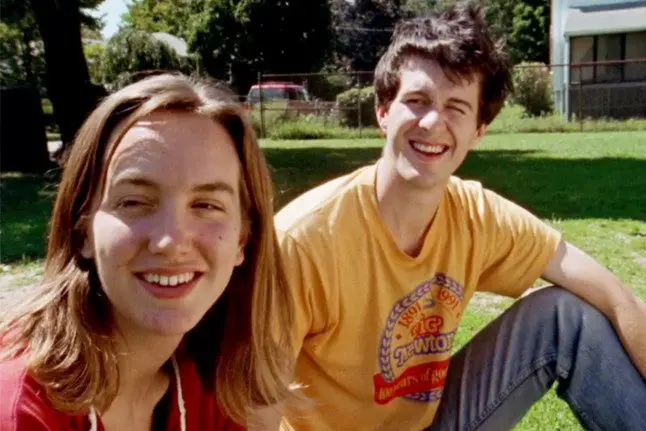
I’m not a fan of Joe Swanberg’s early work that I’ve seen. Honestly, I don’t even remember which ones I have seen. I know Hannah Takes the Stairs (2007) was one of them. Since I didn’t like his early stuff I haven’t really kept up with him. I did end up liking Drinking Buddies (2013). I’ve also heard his Netflix original series Easy is great, and hope to catch up with it eventually.
I don’t know if the Duplass brothers have made a film yet that I haven’t liked. Their first two films, The Puffy Chair and Baghead, are two of my favorite Mumblecore films. Andrew Bujalski’s first two films, Funny Ha Ha and Mutual Appreciation, are also favorites. However, I haven’t had particularly strong feelings towards his films since. I wouldn’t say any are bad, my response to them probably would just be, “Meh.”
By this point, you may be asking, “Well what the hell is Mumblecore, anyways?” I have always struggled with this question. It’s not as easy to articulate what it is, as it is to sense or feel it. Let me try to list a few characteristics. Independent films with minuscule budgets. Generally non-professional actors, at least at the start. People like Mark Duplass and Greta Gerwig (Frances Ha, Mistress America) have made a career partly out of acting. Later Mumblecore films also started getting bigger names.
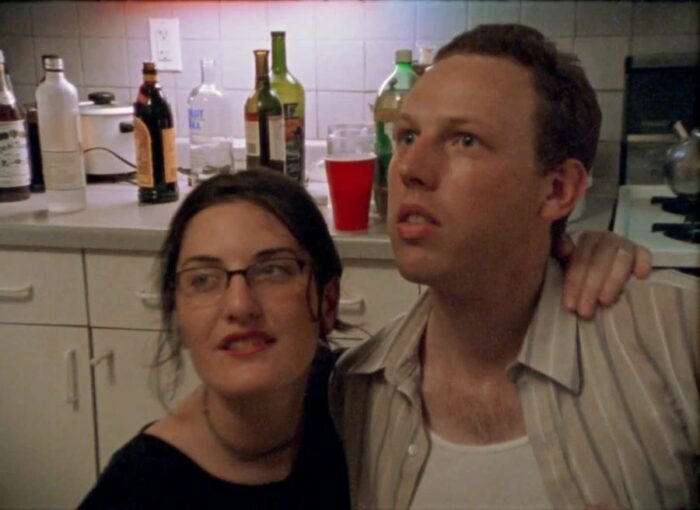
Mumblecore films have less emphasis on plot, or on stakes moving the plot forward. There’s more emphasis on dialogue, characters, relationships, and social interactions. Sometimes heavy improvisation. Characters are often in their twenties and thirties. They tend to be aimless, struggling with romantic relationships, or figuring out what the hell to do with their lives.
Most of all, Mumblecore films perhaps feel like the most realistic or naturalistic films I have ever seen. It would be easy to believe they are instead documentaries, that someone is secretly spying on these people in their everyday lives. From Andrew Bujalski’s point-of-view, he has always been more interested in what happens between the real action of movies. He likes when tension or the stakes are low or non-existent.
That’s enough of that. Let’s actually get to Funny Ha Ha. Bujalski’s debut film opens with what he compares to a James Bond opening. That is, an opening that is practically unrelated to the rest of the movie. A drunken Marnie (Kate Dollenmayer) wanders into a tattoo parlor, considering getting a tattoo herself. The tattoo artist refuses upon discovering she’s inebriated. As he tells her, the headache it will be is “gonna be worse than the headache you’ll have tomorrow morning for me to tattoo you now if you’re drunk.” That’s it. That’s essentially the scene.
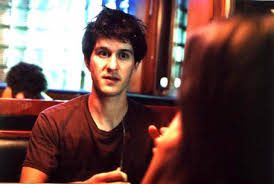
However, this scene does serve to show the uncertainty and spontaneity of Marnie’s current life. Marnie is in her early twenties, out of college. She drifts through various jobs within a short amount of time. As the film opens, she has already lost one job. Marnie asked her boss for a raise. Instead, she got the dreaded conversation that starts with, “Marnie, do you really enjoy working here?” She goes from this to temping, a job on the phone. Marnie hates it and eventually quits. Ultimately she ends up as a research assistant for a religion professor. Her friend Alex (Christian Rudder) sets her up with the job, as the professor is his uncle.
The movie also spends a great deal of time on Marnie’s romantic pursuits. Speaking of Alex, Marnie has long had feelings for the guy. Unfortunately, their timing always seems to be off. In one scene, the two are hanging out together. In the next, Marnie learns that Alex had already broken up with his girlfriend. She discovers this secondhand from her friends Rachel (Jennifer L. Schaper) and Dave (Myles Paige), who are in a relationship. She will discover most information about Alex secondhand.
Marnie confesses her feelings towards Alex to her friends, and they encourage her to pursue him. So does Alex’s sister Susan (Lissa Patton Rudder), who drops in on the three friends randomly. They joke about how their exotic hummus must have lured her to them. Susan doesn’t keep her mouth shut. Alex calls Marnie to shut her down, before she even has a chance to make a move.
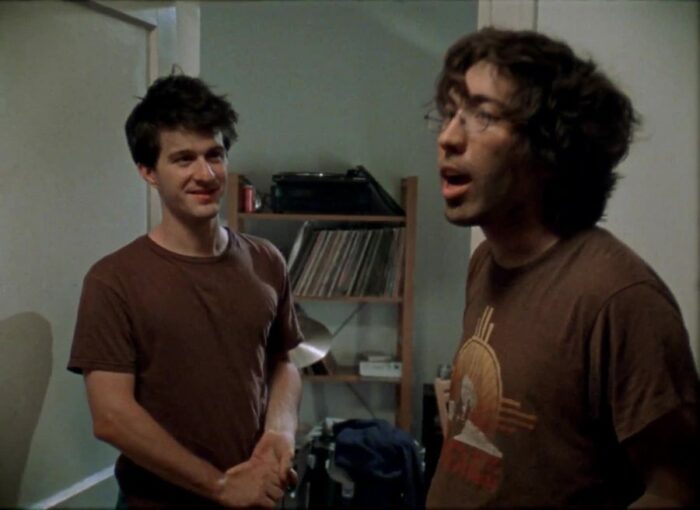
They later have a nice dinner together, even though there’s a defense mechanism shared between them. They have difficulty being honest with each other. Instead, they mock disgust at each other’s actions and jokingly put each other down. Alex is more guilty of this. Even this nice evening is cut short. They find Marnie’s friend Liz (AnitRa Manning) drunkenly passed out in her car near Marnie’s apartment. Feeling a sense of duty to her friend, Marnie leaves Alex to care for her. Next thing Marnie knows, Alex has impulsively married another girl named Nina (Vanessa Bertozzi).
Christian Rudder, who plays Alex, is one of the two core members of the indie rock band Bishop Allen. I was more familiar with Bishop Allen before I ever knew what Mumblecore was. Two of my friends from college, Dan and Rob, were fans. I eventually became a fan through them as well. I’ve even seen them play live. Some of their songs pop up in Bujalski’s films.
The other core member of Bishop Allen, Justin Rice, appears in one scene in Funny Ha Ha. He is Alex’s roommate, Jed. Jed starts to tell an interesting story to Marnie about nearby wiffle ball kids beating him up, but Alex cuts it short. Rice would get more of a chance to shine as the star of Bujalski’s next film, Mutual Appreciation. Rice acted in a handful of smaller films. Rudder however only appeared in one other film, Nick and Norah’s Infinite Playlist (2008). That wasn’t even as an actor, just as a member of Bishop Allen.
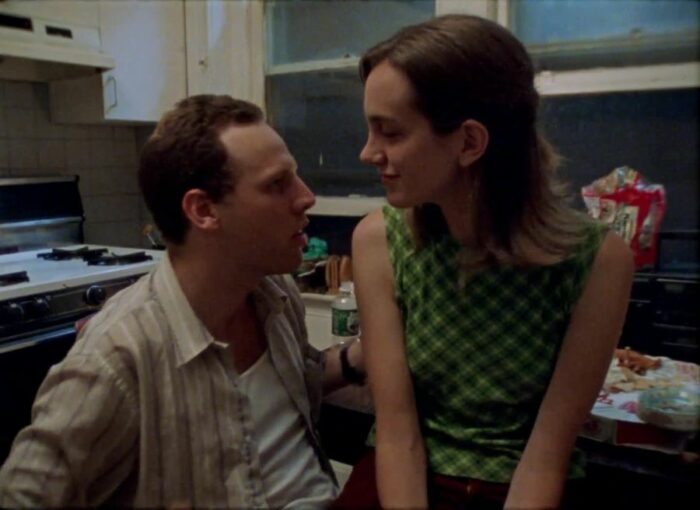
Director Andrew Bujalski plays Marnie’s co-worker at the temp job, Mitchell. In one scene, he theorizes that 90% of the guys she knows are head over heels for her. Marnie rejects this hypothesis, but I think Mitchell may be on to something there. I’ve wondered if maybe I myself have been this oblivious in the past to others’ potential attraction. Probably not. Anyway, I also find Marnie to be charming.
There’s only one guy we see that will completely shut her down, an engineering student named Wyatt (Marshall Lewy). The two awkwardly end up toasting to engineering, then make out in another room. Wyatt cuts it off by simply saying, “I don’t know.” At the same party, Dave also humorously invites Marnie to sit on his lap. He’ll offer his lap to one of his male friends as well. There’s a scene where even Marnie and Dave make out in Marnie’s car. At least until Marnie feels guilty enough to stop it.
Mitchell himself is part of that 90%. Unfortunately, every interaction Marnie has with Mitchell inevitably ends up awkward. Poor guy. He asks her out one day, immediately ready to respond to rejection. Marnie is fine with hanging out, but not so much with going out. Mitchell mentions that she must obviously have a boyfriend. Marnie, not really hearing him, absently replies, “yeah,” so that she’s of course confused when he brings it up again later.
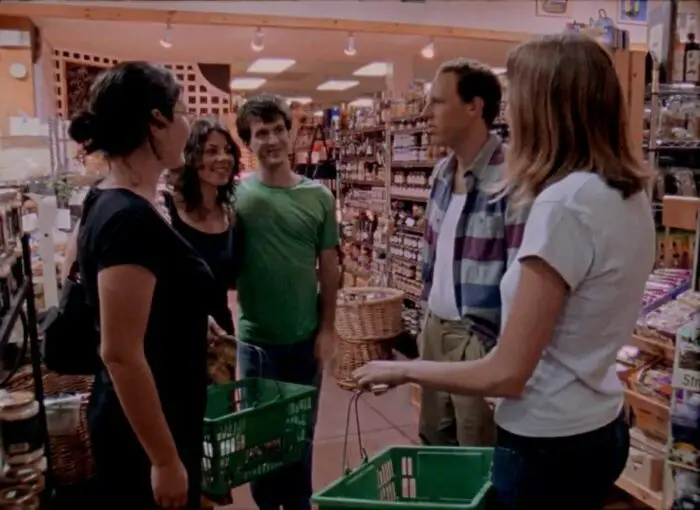
When she confirms that she does not have a boyfriend, Mitchell still can’t directly ask her out. Instead, he asks what she would say “hypothetically” if he asked her out. He also asks how it’s possible that she doesn’t have a boyfriend. Marnie doesn’t know how to answer this question. How can she?
Marnie eventually makes herself a “To-Do List,” trying to stretch herself. I laugh at the last line on her list, which simply reads, “Fitness initiative!!” Marnie invites Mitchell to accompany her in checking off the list. However, one look at Mitchell, and you know basketball isn’t his thing. It doesn’t even seem to be Marnie’s thing. They also try playing chess. Marnie tires herself, and Mitchell still can’t resist making things awkward. He chastises her for not seeming appropriately cheerful. He also somehow assumes dropping a full bottle of beer off her balcony would be funny or charming. It’s not.
I find Funny Ha Ha to be comparable to Judd Apatow films. It’s also about a person, in this case a young woman, learning to grow up into an independent adult before a steady romantic relationship seems able to develop. Her attempts at stretching herself, both with the list or in becoming friends with a female co-worker, may seem random or spontaneous. The point though is that she’s trying.
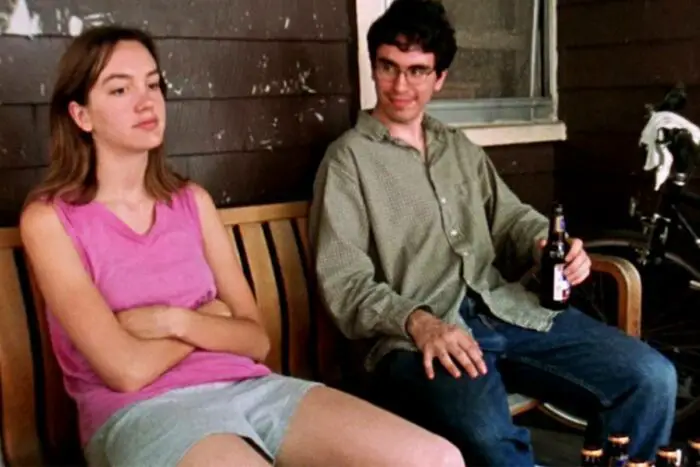
Alex comes back around, getting her out of bed on the night of her birthday. He still has a hard time directly communicating his feelings, dancing around them instead. He says the conversation he’d like them to be having is where he tells her how great she is and how much he appreciates her. Yet he’s not even brave enough to acknowledge that he is having that conversation with her. He jumps to his feet, prepared to leave. Marnie tries to stop him. Alex says, “You can’t chase me, you’re not wearing shoes.” Marnie replies, “I’m not going to chase you.” We believe her.
As strange as this may sound, Funny Ha Ha actually made me think of Looney Tunes. Throughout the film, Marnie and Alex seem to have this Coyote and Road Runner dynamic. Marnie is constantly chasing after Alex, and Alex is constantly elusive, keeping her at a distance. It’s only after she decides to stop chasing that it seems Alex is ready to quit being a turd. Maybe that’s all he really needed to finally own up to the feelings he has for her. They have a final lunch scene together in which he does so. Yet Funny Ha Ha ends with the future of their relationship still ambiguous.
Funny Ha Ha is a film that makes me mourn my youth. It makes me miss the lost days of college that are forever gone. It makes me think of the missed opportunities. I think of the spontaneity of social interactions and the dancing around of feelings common during that stage of life. I’m left with a strange desire to wander into random parties, as Marnie does. Finally, it makes me ponder the lessons I’d want to teach that younger version of myself. Get out more among people. Make a move on that girl or guy, prepared to accept whatever comes of it. Try new things. To put it simply, really live.
